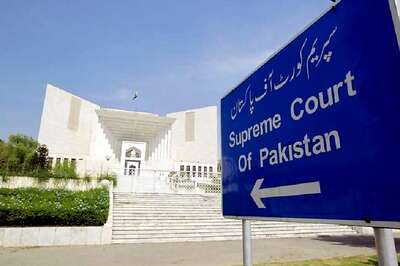
views
WASHINGTON: Justice Ruth Bader Ginsburg’s death will be felt at the Supreme Court in the coming weeks as it starts a new term with a 5-3 conservative majority while preparing for a major case on the Obamacare healthcare law and possible emergency election-related disputes.
The court officially returns on Oct. 5 from summer break with a two-week session of oral arguments held by teleconference, although it handles last-ditch appeals whenever they arise.
With the normally nine-justice court operating one member down following last week’s death of the 87-year-old Ginsburg, a liberal icon, there is the possibility of 4-4 splits, but also, as has been shown in the past, potentially more desire for compromise among the justices.
With just three liberal justices left, there is little chance that the five-justice conservative wing of the court can be thwarted, even if Chief Justice John Roberts, who has sided with the liberals in big cases recently, was to do so again.
The court as recently as 2016 spent 14 months without a ninth justice following the death of conservative Antonin Scalia, a period in which the justices often sought compromise. The justices, who get to pick which cases they hear, also avoided taking up some contentious cases.
“There is a concern that really big changes that are made without a full complement of justices may not been seen as legitimate. I hope the court will be similarly cautious during this period,” said Deepak Gupta, a regular Supreme Court lawyer.
Complicating matters even further, the normally collegial court has been conducting its business remotely since March because of the COVID-19 pandemic.
Republican President Donald Trump has said he wants a nominee confirmed before the election on Nov. 3, when he is seeking a second term in a race against Democrat Joe Biden. He said on Monday he would make an announcement as early as this weekend, with appeals court judges Amy Coney Barrett and Barbara Lagoa viewed as front-runners.
Looming on the horizon are Nov. 10 oral arguments in the latest challenge to Obamacare, a case in which Ginsburg’s vote might have been crucial. The Supreme Court previously upheld the law, known officially as the Affordable Care Act, on a 5-4 vote in 2012. Ginsburg was one of the five justices in the majority then, which means that her absence could tilt the balance.
Republican-led states and the Trump administration have asked the court to strike down the entire law, which is being defended by Democratic-led states and the House of Representatives.
There is a strong chance the court will have to weigh in on election-related litigation, potentially even having a major say over which candidate ultimately wins.
Sylvia Albert, director of voting and elections for Common Cause, a voting rights group, said Roberts would likely seek a compromise in such a situation because he is “concerned with his legacy and trying to find a middle ground.”
Any other emergency applications made at the court in the short term could also be affected by the lack of a ninth justice.
For example, in a case that the court could act on at any time, the Trump administration has asked the justices to put on hold a federal judge’s decision to block during the pandemic a U.S. Food and Drug Administration rule requiring women to visit a hospital or clinic to obtain a drug used for medication-induced abortions.
Abortion is one of the most divisive social issues facing the court and conservative activists want Trump to pick a nominee who will curb abortion rights, which Ginsburg repeatedly voted to uphold.
HIGH-STAKES CASES
With Ginsburg’s absence, the court’s initial votes in cases argued in October could be 4-4, meaning that if a decision was issued, the lower court ruling would stand and no nationwide precedent would be set if that was the final outcome. The court would most likely order such a case to be reargued after the Senate confirms Ginsburg’s successor.
Among the cases being heard in the first week is a high-stakes software copyright dispute between Alphabet Inc’s Google and Oracle Corp that is potentially worth billions of dollars to the winner.
Other cases the court has taken up for its new term could also be affected. On Nov. 4, the justices consider a major legal fight over the scope of religious-rights exemptions to certain federal laws. The dispute concerns Philadelphia’s decision to bar Catholic Social Services from participating in its foster-care program because the organization prohibited same-sex couples from serving as foster parents.
The court on Dec. 2 weighs a bid by the Democratic-led House to obtain material the Trump administration withheld from former Special Counsel Robert Mueller’s report on Russian political meddling in the 2016 presidential election.
Disclaimer: This post has been auto-published from an agency feed without any modifications to the text and has not been reviewed by an editor




















Comments
0 comment